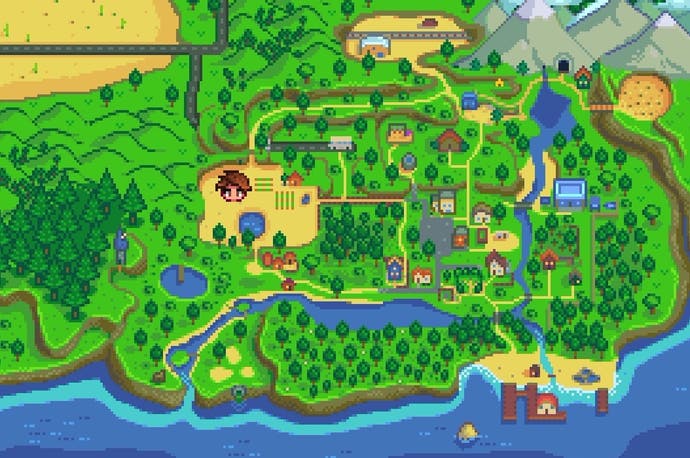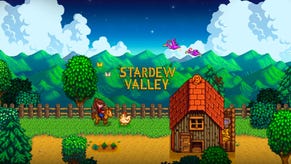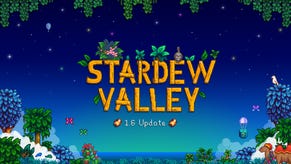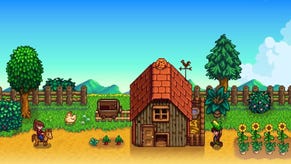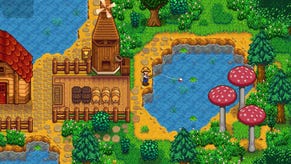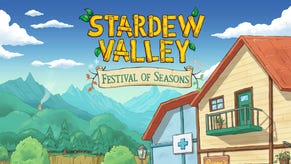Stardew Valley review
Dig for victory.
In the early-noughties the beloved proprietor of the only shop in my grandmother's South Devon village died unexpectedly. While the villagers mourned, a question loomed: who would sell the eggs, order the newspapers, and chat with the lonely now that he was gone? Soon, a rumour spread: one of the major supermarkets planned to take over the vacated premises. A group of dismayed villagers rallied with an obstructive plan: they would pool their resources, run the shop as an independent business and, with a certain Blitz resolve, hold back the corporate invasion.
It's the kind of sentimentally defiant local English story that dames Maggie Smith and Judy Dench could whimsically play on the big screen with Oscar-baiting performances. And it's also, broadly, the premise of Stardew Valley, 2016's PC hit portrayal of agrarian life which has finally been ported to Nintendo's Switch, hardware to which the game is joyously well-suited.
In Stardew Valley, the corporation threatening the rural life is Joja Mart, whose manager thinks nothing of walking into Pelican Town's shop, run by a bespectacled man called Pierre, wielding a fistful of 50 per cent-off coupons to lure away faithful customers. The temptation to allow Joja, with its slick money, to take over the community is severe. The local railway line is in ruins, the town hall derelict and critter-infested. Pelican Town's mayor admits that, the next time a villager signs up for a Joja loyalty card, he will hand over the once-proud premises to big business. Pelican Town's community, in other words, is making its final stand against commercialisation, principally via a few well-kept herbaceous borders.
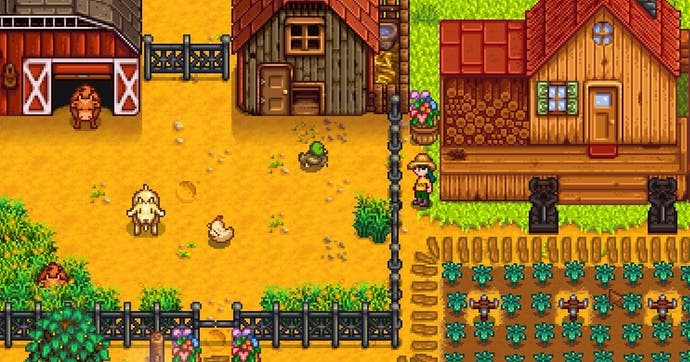
You have your own, more immediate problems to deal with, however. One day, while working another grey, repetitive day at Joja Mart's head office, you open a letter from your departed grandfather, correspondence that he instructed you to read only when you were at your wit's end. Anticipating your existential crisis your grandfather, it turns out, left you his farm in Pelican Town. You promptly quit your job and arrive in town to find a cluster of tumbledown buildings, overgrown fields, garbage-choked ponds and a leaky house. So begins the work.
If, in premise, Stardew Valley risks an overly sentimental portrayal of rural existence, its depiction of the upstart farmer's hard life pulls no punches. Every day you wake at 6am and, for the first month at least, expend your day's limited energy on chopping down trees, smashing rocks and scything weeds in order to clear some land for tilling and planting. Once your energy is depleted (which can happen by lunchtime) you must go to bed for the night or risk total exhaustion, a state that will halve your energy supplies for the following day. The logs, rocks, sap and other tufty resources you collect from this callus-making work can be deposited in a crate next to your house, where they're collected each night in exchange for a few miserable coins.
The economy, in these early hours, is brutal. It takes days to save up enough for a few packets of seeds to kick off the enterprise. Once these are planted, you'll need to water the shoots every day until finally, in one ecstatic moment, you wake up to find a squat cabbage, or a lanky runner bean outside your door. This produce can either be consumed, to refill a tiny bit of energy for the day, or sold, enabling you to purchase more seeds and start the process over. Soon enough, you'll want to start developing your farm by, for example, hiring a local builder to knock-up a chicken coop, or repair an outhouse. For this you'll need, typically, a Minecraft-load of saved resources - logs, rocks and the like - as well as some significant savings. Everything in Stardew Valley takes time, energy and effort. But in this slowing down of the familiar rhythms of video game effort and reward, Stardew Valley's powerful magic emerges.
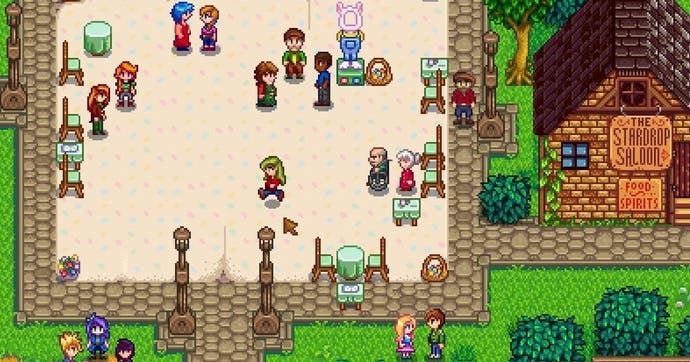
As well as agriculture, it's possible to make a living through fishing (Pelican Town is a coastal town; you can beach comb for sellable resources, or fish from the end of the pier in a well-tuned minigame for produce that can be sold at the local fishmongers) or through mining. A local cave network is filled with precious rocks from which ore can be collected and, once you are able to craft a furnace, smelted. The caverns are also home to Dragon Quest-esque monsters, so Stardew Valley's mining "track" doubles as a kind of action RPG, where you must routinely switch between pickaxe and sword, repping for the local adventurer's guild while descending, floor-by-floor, ever deeper into the mines, with their ever-more valuable treasures.
Farming, fishing and mining: it's possible to fully dedicate your new life to any one of these pursuits, but effort in one area inevitably benefits the others. For example, when mining you harvest ore that can be turned into gleaming bars in your furnace. Present the local blacksmith with this precious metal and he can upgrade your tools (which are arranged in a Minecraft-esque inventory at the bottom of the screen) that enable you to increase your work rate back on the farm. The interlocking systems encourage exploration and experimentation; the range of diversions can be overwhelming.
As the seasons pass, you slowly increase your abilities, unlocking new items for crafting and resources at the local shop while broadening the range of activities to which you can apply your limited time and energy each day. Save enough money and you can install automated systems to keep your crops watered and animals fed (or, if you prefer, you can snag yourself a husband or wife, who can take some of the burden) allowing you to focus on other hobbies and interests, such as brewing craft beer, beekeeping, crab-catching, playing on the arcade machine in the local bar, or cooking the various recipes you learn from watching the food channel on your TV.
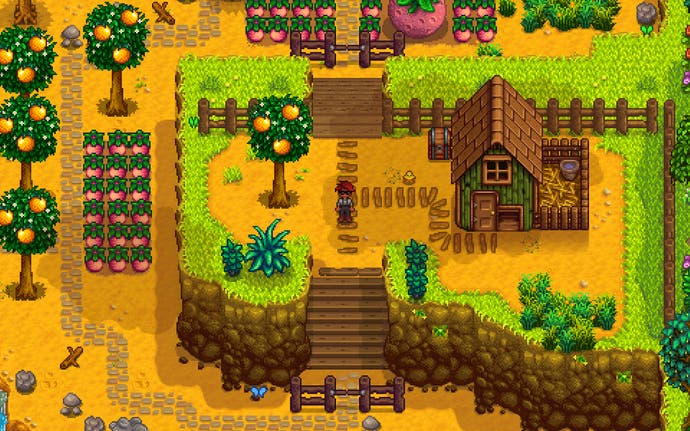
Then there are your responsibilities within the local community. As in the game's most closely observed inspiration, Harvest Moon, your new home town is filled with people to get to know, each with their own distinct personalities, tastes and predilections. A notice board outside the local shop informs of you of upcoming birthdays and checking-in with the locals builds rapport and intimacy, which in turn triggers scenes in which you get to know the townspeople better. As in Animal Crossing, the local museum can be filled with collected items of interest. No matter which direction you choose to press, Stardew Valley bends, beautifully, rewarding your efforts in kind.
On Nintendo's Switch, where Stardew Valley can be readily accessed in front of the sofa, in bed, or on the road, there's even a moral to the game's long arc. As your enterprise grows and grows, you risk becoming a slave to the vast, churning agricultural machine of your own design. Unless you keep your capitalistic urges in check, you may find yourself building a rustic-themed version of the life from which you fled, trading one rat race for another.
Flitting between an ever-growing list of responsibilities, constantly assessing how best to min-max time, attentive players will notice relationships with the townspeople start to hollow out. You risk becoming, in time, a cautionary tale within a cautionary tale. In this way Stardew Valley explains and reinforces its narrative theme with its mechanical workings. It is this inspired flourish that elevates the game from alluring entertainment to a resolute classic.
